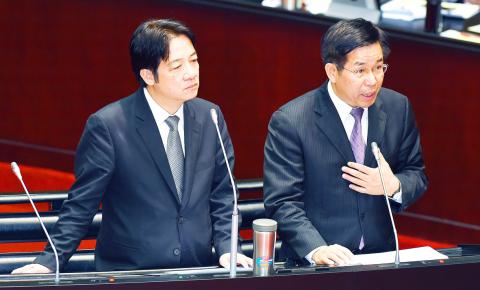The Ministry of Education is to comb through its Chinese-language idioms dictionary to remove any entry that might promote sexism, Minister of Education Pan Wen-chung (潘文忠) said yesterday, amid controversy over entries that have been criticized as shaming women’s bodies.
Pan made the remarks at a question-and-answer session at the legislature in Taipei, when he was asked by Democratic Progressive Party Legislator Yu Mei-nu (尤美女) what his thoughts were on two entries: “aircraft carrier” (航空母艦) and “washboard” (洗衣板).
According to the online dictionary, the term “aircraft carrier” is also used to describe “women with large bodies,” with the example: “Her figure is just like an aircraft carrier.”

Photo: Liao Chen-huei, Taipei Times
“Washboard” is a term used to describe “women with flat bosoms,” the dictionary said.
The entries sparked a torrent of criticism online after they came to light this week and received broad local media coverage, with critics calling the terms sexist and body shaming.
The entries were “very inappropriate,” Pan said, adding that they date to 2000, when the idioms were more commonly used.
The dictionary is used by about 50,000 people each day, Pan said, adding that it should be updated to be brought in line with today’s language usage.
As the idiom dictionary is the standard reference used by students of all ages when preparing for exams, entries with sexist connotations should be removed or explained with footnotes, Yu said.
The underlying sexism in education is indoctrinating, which could help explain the constant setbacks experienced by women’s rights groups when pushing for gender equality, she said.
The ministry is conducting a thorough review of the dictionary to make it more conducive to promoting gender equality, Pan said, adding that it would remove inappropriate or outdated entries in two weeks and add footnotes where it deems necessary.
The alternative explanation for “aircraft carrier” was yesterday marked as “derogatory,” and the example was removed.
The entry for “washboard” was also removed yesterday.

PREPAREDNESS: Given the difficulty of importing ammunition during wartime, the Ministry of National Defense said it would prioritize ‘coproduction’ partnerships A newly formed unit of the Marine Corps tasked with land-based security operations has recently replaced its aging, domestically produced rifles with more advanced, US-made M4A1 rifles, a source said yesterday. The unnamed source familiar with the matter said the First Security Battalion of the Marine Corps’ Air Defense and Base Guard Group has replaced its older T65K2 rifles, which have been in service since the late 1980s, with the newly received M4A1s. The source did not say exactly when the upgrade took place or how many M4A1s were issued to the battalion. The confirmation came after Chinese-language media reported

The Taiwanese passport ranked 33rd in a global listing of passports by convenience this month, rising three places from last month’s ranking, but matching its position in January last year. The Henley Passport Index, an international ranking of passports by the number of designations its holder can travel to without a visa, showed that the Taiwan passport enables holders to travel to 139 countries and territories without a visa. Singapore’s passport was ranked the most powerful with visa-free access to 192 destinations out of 227, according to the index published on Tuesday by UK-based migration investment consultancy firm Henley and Partners. Japan’s and

A Ministry of Foreign Affairs official yesterday said that a delegation that visited China for an APEC meeting did not receive any kind of treatment that downgraded Taiwan’s sovereignty. Department of International Organizations Director-General Jonathan Sun (孫儉元) said that he and a group of ministry officials visited Shenzhen, China, to attend the APEC Informal Senior Officials’ Meeting last month. The trip went “smoothly and safely” for all Taiwanese delegates, as the Chinese side arranged the trip in accordance with long-standing practices, Sun said at the ministry’s weekly briefing. The Taiwanese group did not encounter any political suppression, he said. Sun made the remarks when

BROAD AGREEMENT: The two are nearing a trade deal to reduce Taiwan’s tariff to 15% and a commitment for TSMC to build five more fabs, a ‘New York Times’ report said Taiwan and the US have reached a broad consensus on a trade deal, the Executive Yuan’s Office of Trade Negotiations said yesterday, after a report said that Washington is set to reduce Taiwan’s tariff rate to 15 percent. The New York Times on Monday reported that the two nations are nearing a trade deal to reduce Taiwan’s tariff rate to 15 percent and commit Taiwan Semiconductor Manufacturing Co (TSMC, 台積電) to building at least five more facilities in the US. “The agreement, which has been under negotiation for months, is being legally scrubbed and could be announced this month,” the paper said,